



The new millennium with mystifying convergence of IT has opened new challenges to LIS profession. This has resulted to continuous skill development and lifelong learning, for capacity building in consonant with contemporary changes. The LIS profession in India has created several mechanisms to organize and conduct several skills development programmes through which professionals are continuously enabled to update their professional knowledge and skills,in practice and teaching. There is a good organizational infrastructure and identified areas related to the recent developmental trends and as such LIS professionals and educators have facilities for updating their knowledge at veritable levels and intervals. The paper has surveyed programmes conducted by different organizations at different levels and highlights the aspects of the organizational infrastructure and the emergent areas of applications in LIS teaching,research and professional practices in India. The selection of areas and subjects for various skill development programmes suggest the competencies acquired by the LIS professionals from India, and the empowerment of their professional knowledge can be of immense value to its neighbouring countries. The paper highlights the knowledge and competencies of the LIS professionals in India and the broad-based facilities available here which can be a model for those countries which are seeking to utilize the LIS human resources from this part of the sub-continent. The paper in this circumstance surveyed on the institutional infrastructure for skill developmental opportunities available in India which would meet such requirements within and to the countries outside in the South Asian region seeking its collaboration in such manpower development work.
IT의 융합과 함께 시작된 새로운 천년을 맞이하면서 도서관 전문직은 새로운 변화에 적응하기 위해 지속적으로 기술개발과 평생학습을 위한 노력을 해야 하는 상황에 직면하고 있다. 이 논문은 인도의 도서관계에서 이러한 상황에서 실무와 교육을 위한 전문지식과 기술을 지속적으로 새로이 하기 위해 마련하고 있는 최신의 프로그램과 활동들을 분석하였다. 특히 이 논문에서는 인도가 가지고 있는 조직적인 인프라와 문헌정보학의 교육과 연구, 실무에 응용할 수 있는 새로운 분야들에 대해 집중적으로 살펴보았다. 이러한 프로그램과 이를 통해 얻은 잠재적인 능력들은 인도는 물론 서아시아를 포함한 인근국가의 프로그램개발과 인프라구축, 나아가서는 인력개발을 위한 협력에도 도움이 될 것이다.
The new millennium with mystifying con-vergence of IT has opened new challenges to Library and Information Science (LIS) pro-fession.This has resulted to continuous skill development and lifelong learning, for capacity building in consonant with contemporary changes. The LIS education despite this high degree of diffusion of knowledge of infor-mation technology has maintained its unique identity and traditional focus. The develop-ment in the area of technology convergence with LIS has necessitated LIS professionals and educators to perpetuate their learning and in the deployment of the skills to the users and to the learners. It has been observed by Ashcroft and Watts (2005) that “the emer-gence of electronic information resources have created subsequent changes in the skills needed by information professionals” and “Information professionals are now expected to be aware of and capable of using emerging information communication technologies”. In this context it is also highlighted that“Professional bodies, such as CILIP in the UK and the ALA in the US, recognize the importance of continuing professional devel-opment in order to keep skills and expertise up-to-date for all aspects of work”. In this context in India several programmes and ac-tivities are organized by the statutory, pro-fessional and regulatory organizations since early 1970s. The primary organizations in-volved in this process are the UGC, AICTE, national associations and institutions have tak-en very active role in organizing regular and need based skill development programmes both for LIS practitioners as well as to the educators. The role of professional bodies in this context is widely recognized and it is sub-stantiated by Fisher (1994) on the role of pro-fessional bodies in professional development. The magnitude of LIS practitioners and the teachers can be assessed from the broad esti-mate of about 55 thousand libraries of all cat-egories and more than 120 LIS teaching de-partments imparting education from certifi-cate to doctoral programmes through formal channels as well as large number of distance learning facilities available in India. The LIS scenario is changing at a very random pace though there is a structural development in the application of technologies in libraries as well as with new trends in management of libraries. This calls for building and upgrading skills of LIS practitioners as well the teachers. As pointed out since the early 1970s regulatory and statutory bodies in higher education like UGC, the national associations like ILA, IASLIC the specialized autonomous LIS bod-ies like INFLIBNET, DELNET, NCSI and many more similar organizations it is ob-served are continuously involved in the skill development programmes for Librarians and teachers of LIS in India. Hence the paper take stock of institutional infrastructure and the new areas of competences focused to build skills among the LIS professionals and educators in India. It also foresees how these skills acquired through some of the finest in-stitutions and associations can be utilized by the other nations in the South Asian region and in particular by the SAARC countries.
One of the major challenges forced by the ITs is continuous and overall learning process in all of services which is also termed as life-long learning process. Lifelong learning as a concept involves formal, non-formal and in-formal education and training programmes. Such a work on a regular and continued stream requires a permanent establishment of organizational infrastructure and needs such a facility at different levels. On the other hand the involvement of the statutory government organizations, professional association, and even the individual institutions level have to get involved in this work and need the neces-sary physical, manpower and equipment fa-cilities and infrastructure. Counting on these requirements and also considering the essen-tial need for skill development programme with the changing paradigm of teaching and learning influenced by technology is demand-ing for acquisition of knowledge and skills in rendering service as well as importing latest knowledge to the learners. The need is due to the user’s perceptions and expectations which are getting renewed due to number of opportunities available to the users outside their formal educational channels. As exam-ined by Webb (1992) “a fresh look at educa-tion, training and continuing professional de-velopment (CPD) at all levels and in all sec-tors of the library and information science pro-fession,for what currently exists and to meet the future needs”. As a matter of fact the aca-demic computing skills can be acquired through informal means which can be utilized for the improvement teaching and learning in the formal means. Due to the availability of e-learning and m-learning facilities academic computing in general and knowledge of e-learning tools in particular is becoming essential. In this context the need for con-tinues skill development has a place in every sector of education. It is exceptionally so in the context of LIS education as it covers en-tire domain of human knowledge. Brown (1992) has chalked out a framework for such continuous professional development for LIS staff. So it is important in this context to identify how such needs are fulfilled and what are the organizational infrastructure available as well the with identification of core areas in which these competencies are created among the LIS practitioners and as well among educators in India. The need for continuing professional education is stressed long ago by Feather and Smith (1998) and it is apparently more so in developing countries. Cortez, Britz and Kigongo-Bukenya (2008) have addressed the need for structured access to continuing education opportunities for LIS faculty in Africa in general and in sub-Sahara Africa in particular. The authors have identi-fied number of challenges and barriers faced by these countries in CEP. So in this context, Indian LIS faculty and professionals can as-sociate for designing and delivery of appro-priate continuous professional development programmes and courses.
A survey method is adopted in this paper. It was realized that India there is a good in-stitutional infrastructure for the CPD for LIS professionals. The author incidentally is re-ceiving several communications of CPD pro-grammes, conference announcements being members of the several professional bodies and organizations. Besides, the author also served as the resource persons for the Re-fresher and Orientation Programmes con-ducted by the Academic Staff Colleges estab-lished by University Grants Commission, in many Universities. Thus the collected sources of information on CPD prompted the author to conduct a survey of CPD programmes con-ducted by several professional bodies and make an assessment of the professional skill development programmes organized in India. Hence a documentation of institutional infra-structure was made by collecting details of programmes of CPD conducted by these in-stitutions and organizations. Thus the primary data on programmes was compiled from dif-ferent sources and documented. The details are presented in Appendix - I.
4. Criteria for the analysis of Survey data
The main criteria for the analysis of the programmes are based on the broad ob-jectives and activities laid down by them in the process of professional development. The survey data also include the themes of the professional subjects, which normally include emerging thrust areas and also are part of teaching curriculum and the practices adopted by the library and information systems. Each programme and its theme and sub-themes were observed with relevance to teaching, re-search activities pursued in the Post-graduate programmes. It is also observed that, the con-ferences are held in an annual sequence with-out intermittent break and thus they provided an opportunity for lifelong learning process by the professionals. It is found from the par-ticipants from the CPD programmes that the Organisations and Institutions where they are working encourage their employees to attend, and some of them have a mandate in this regard. Hence every employ gets an oppor-tunity to attend one or two programmes in a year and also present papers, case studies, and deliver lectures on specialized topics.
5. Organizational Infrastructure
It is well known fact from the data col-lected, in India there are number of channels at different levels, national, regional and lo-cal, through which the skill development and continuous professional development pro-grammes are being organized and conducted by the statutory, organizations, professional associations and specialized agencies and institutions. The institutional infrastructure is well established in India with all necessary, essential facilities for in-house training with extensive use of educational technology fa-cilities. As a result they have built adequate expertise to impart such training outside their own requirements. The kinds of organizations and agencies which are actively involved in skill development programmes and have the requisite and adequate infrastructure in con-ducting such programmes are listed below.
1. Academic Staff College under University Grants Commission (UGC)
2. Professional Associations -- National and Regional
3. Specialized Agencies like INFLIBNET, DELNET, NASSDOC, INDEST, Vidyanidhi
4. Specialized Training Institutions namely NISCAIR(INSDOC), DRTC, NCSI
5. Post-graduate Departments of Library and Information Science in Universities
6. Academic, Public and Special Libraries and Information Centres
5.1 On Scope of the Organisational Programmes
It is to be noted that each of the above has a different focus and deal with the issues rel-evant to the scope and objectives of the or-ganisation and also their areas of activity. The Academic Staff Colleges for instance, conduct programmes on broad-based areas -for example the Orientation Programmes in-clude several topics of common interest to participants from diverse disciplines. For ex-ample, topics like Digital Divide, Intellectual Property, and Research Process and others are dealt in the orientation programmes of ASC. The Orientation Programmes are sandwiched between Subjectwise Refresher Courses. The Specialised agencies like INFLINET and DELNET on the other hand deal on their specialist areas; Library Auto-mation and Networking of Libraries. The Annual Conventions organized them make an assessment and evaluation of their support programmes. The post-graduate departments and specialized training institutions select areas of current interest and also on emerging future trends, which would be useful to aug-ment them in teaching.
The UGC in India established ASCs within the administration of a University to impart the skill development programmes for teachers and practitioners. The Orientation Courses and the Refresher Courses are the two streams or-ganized by the ASCs., and for the LIS practi-tioners as well as for educators number of gen-eral and theme based programmes are or-ganized by them which will help in empower-ing the participants to acquire the necessary knowledge and skills in teaching, research and practice. ASCs have excellent physical infra-structure facility including independent hous-ing for conducting the programme, includes multimedia classroom with Internet con-nectivity, IT labs, housing for the participants and library. Besides the physical facilities ASCs invite experts from different regions and subject areas as a Resource Persons to deliver the lectures and demonstration on latest areas of development in the selected topics. An at-tendance to skill development programme has attracted many professionals in their respective areas and has become one of the very popular beneficial promotional activities.
The two national associations in India, the Indian Library Association (ILA) and Indian Association for Special Libraries and Infor-mation Centres (IASLIC) since the establish-ment have taken the task of imparting pro-fessional knowledge through their confer-ences, pre-conference tutorials and training programmes in the contemporary areas of pro-fessional knowledge. The IASLIC has even created Special Interest Groups (SIGs), to fo-cus on the new and emergent issues of LIS and therefore the trends of developments are also discussed in the conferences.
Apart from the ILA and IASLIC, there are other professional associations in India alike Society for Information Science (SIS) and Indian Association for Teachers of Library and Information Science (IATLIS), Medical Library Association of India (MALI), Management Library Network (MANLIBNET) which are also actively involved in organizing profes-sional advancement programmes regularly. The IATLIS for example organized in recent years National level Workshops for LIS teach-ers under the theme “LIS teachers and the Digital Future” with the collaboration of na-tional level institutions like IITs and IIMs. The SIS in mid-1990s organised two Inter-national Conferences one on “Database pro-duction and distribution: resources, technol-ogy, and management” (Society for Information Science 1993) and the second on “Digital Libraries” with an eye on the futuristic view of the profession (Society for Information Science 1996).
The growth of information institutions and systems has caught the attention of Govern-ment of India as early as in 1970s this re-sulted in launching the NISSAT programme under the Department of Science and Tech-nology (DST). The NISSAT was responsible for the development of Information Infra-structure in national laboratories under CSIR.The NISSAT organized several courses as a capacity building exercise of the LIS pro-fessional working in the national laboratories which helped in the creation of national and sectorial information centres like, National In-formation Centre for Food Sciences (NICFOS), Mysore, Information Centre for Aerospace Sci-ence and Technology (ICAST), under National Aerospace Laboratory, Ban- galore. The ef-forts of NISSAT in this context empowered the LIS professionals to gain substantial knowledge of planning and design of speci-alized information institutions, under R and D, Industries and Business organizations.
The developments in IT and impact on Li-braries particularly the Library Networking visualized the establishment of National Library Networks like INFLIBNET and DELNET and also resulted in conceptualizing several metropolitan library networks. The INFLIBNET, a UGC autonomous centre established in 1988 was given the task of networking University and College Libraries in India. The two agen-cies specializing in library networking are or-ganizing annual national conventions, CALIBER and NACLIN to take stock of the progresses made in the area of Library Automation and Networking and the participation and deliber-ations of these meetings are most enlightening experience of professional areas. In recent years they are also focusing on the Digital Libraries, Open Access Initiatives, Knowledge Management and other similar upcoming is-sues in LIS.
The documentation centres in India also made a parallel contribution in the skill en-hancement of LIS professionals and in this contest, DRTC, NASSDOC and NISCAIR (Former INSDOC) and NCSI (under IISc) are also conducting further educa-tion and training programmes for the professionals. The DRTC and NISCAIR are also running formal education courses in Information Science and Tech-nology with slanginess towards IT oriented study and teaching.
The Vidyanidhi is engaged in the creation of Digital Library of Electronic Theses and Dissertations, with financial assistance from Ford Foundation, Microsoft and other inter-national and national funding agencies like DST in India. The programme under its ban-ner has also engaged several training pro-grammes as part of professional competency building work.
This profile of contributions from speci-alized agencies is dealt in very briefly here, as detailed contributions of these agencies is far and wide and also presents in depth treat-ment of the subject of discourse viz., LIS.
5.5 Departments of Library and Information Science (LIS)
The pioneering work of LIS education in India is referred to Baroda School, which made the auspicious beginning for formal course in LIS as early as in 1911, in con-currence with the Baroda Library Movement. Since then the LIS education in India has been on the rise. Today, more than 120 Universities are offering courses in LIS from Certificate level to doctoral programmes. Among the developing countries, India has the largest number of Ph. Ds. in LIS this number is nearly 1500 at present. Several studies and reviews on the LIS research trend and on the census of Ph.D. Theses output in India were carried out by Kumar (1998),Patra and Chand (1996), Chandrashekar and Ramasesh (2009), and Garg, Tamrakar, R.and Tamrakar, A. (2009). The papers also give a prolific image of Ph.D. guidance ex-pertise available in Indian LIS departments. There are teachers who have guided doctoral works in many diverse areas of LIS and co-ver both traditional and contemporary subjects with ICT applications.
The Departments of Library and Infor-mation Science are also actively involved in organizing National/International Conferences on the modern and emerging areas of LIS. The participation in these conferences is highly sought as they expose the teaching faculty in particular about the latest develop-ments in the areas of LIS and also deal with modern teaching methods, curriculum devel-opment and pursuance of research in the areas of recent applications. The teaching faculties have also created substantial magnitude to learning and teaching materials and they have also been contributing to the Self Instructional Materials (SIM) including A-V tools generated by the Distance education programmes like Indira Gandhi National Open University (IGNOU) and the distance education courses in LIS offered by several State and Central Universities. These SIMs and A-V materials are under Open Access Course Ware and can be accessed free world-wide with a simple reg-istration process. The e-Gynakosh of IGNOU is an example of this instance of Open Course Ware (OCW). The LIS-OCW work can be ex-tended to cover the entire South Asian Region by receiving inputs from respective countries and rendered accessible via Internet / WWW.
5.6 Libraries and Information Centres (LICs)
India possesses a vast number of public, academic and special libraries, which according the National Knowledge Commission’s rough estimate is around 55,000 libraries of different categories and magnitudes. There are more than 500 Universities and 26,000 Colleges with libraries adapting to latest tech-nological developments. Besides there is large number of professional college li-braries, in engineering, health science and management and these have reckoned importance of the libraries and are engaged in providing service with a modern developmental touch. To
The profile of organization infrastructure and the progrommes underway for the skill development programmes and facilities in India surveyed and compiled from different sources, shows the wealth of expertise avail-able in this part of the sub-Continent. It wouldn’t be out of context to state that, set-ting aside the developed countries, India pos-sesses an excellent organizational infrastruc-ture of different categories, with their own ob-jectives and scope of activities, thereby it is possible to build the manpower resources of international quality. They provide oppor-tunities for the acquisition of pro-fessional and technical competency at all levels of LIS professional knowledge, in teaching, practice, guidance and consultancy. Since the pro-grammes are held regularly annually, there are the avenues for the continuous pro-fessional development and as a lifelong learn-ing process. This road map of LIS manpower resources and the facilities for education, re-search, training and further education can be utilized for the benefit of the nations in the South Asian Region.
It is overwhelmingly evident that India possesses necessary expertise for the future development of the LIS profession which would see more and more interdisciplinary applications and diversity. The INFLIBNET as part its work has created an Experts’ data-base in different subjects and this can be aug-mented with inputs from other nations of the South Asian Region so that the exchange of expertise at regional level would be im-plemented easily.
In this paper mention is made of the sev-eral programmes organized by the national level professional associations, specialized agencies and departments of library and in-formation science and others. A list of such programmes with their themes and areas is given as an addendum to this paper (See Appendix I).
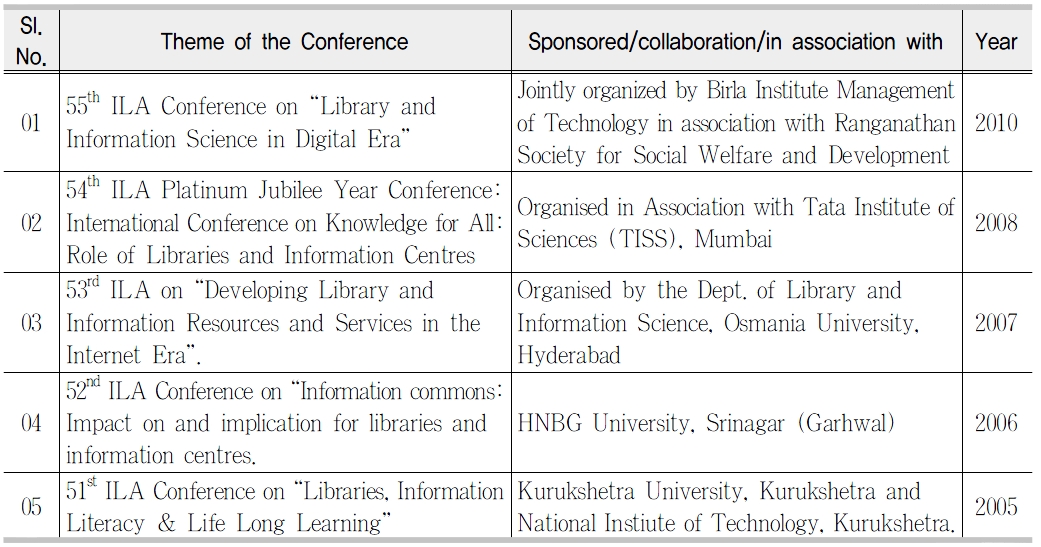
List of Conferences Conducted during last Five Years by the NationalLevel Professional Associations Indian Library Association (ILA)
[Table 2.] Indian Association of Special Libraries and Information Centres (IASLIC)
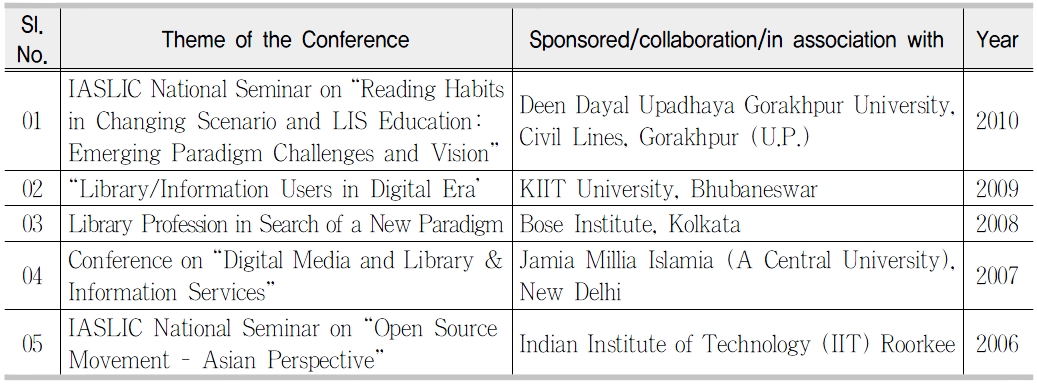
Indian Association of Special Libraries and Information Centres (IASLIC)
[Table 3.] Indian Association of Teachers in Library and Information Science (IATLIS)
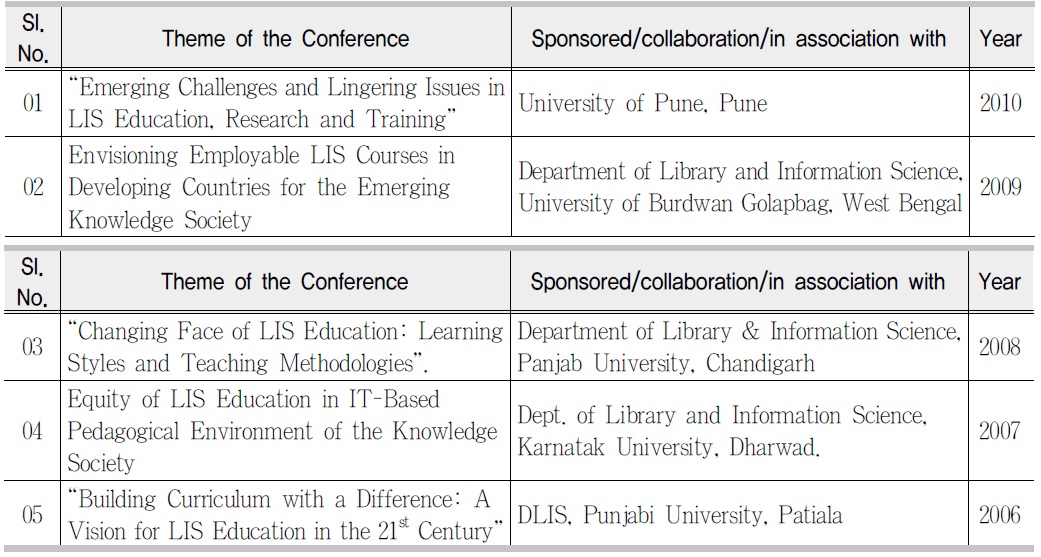
Indian Association of Teachers in Library and Information Science (IATLIS)
[Table 4.] Society for Information Science (SIS)
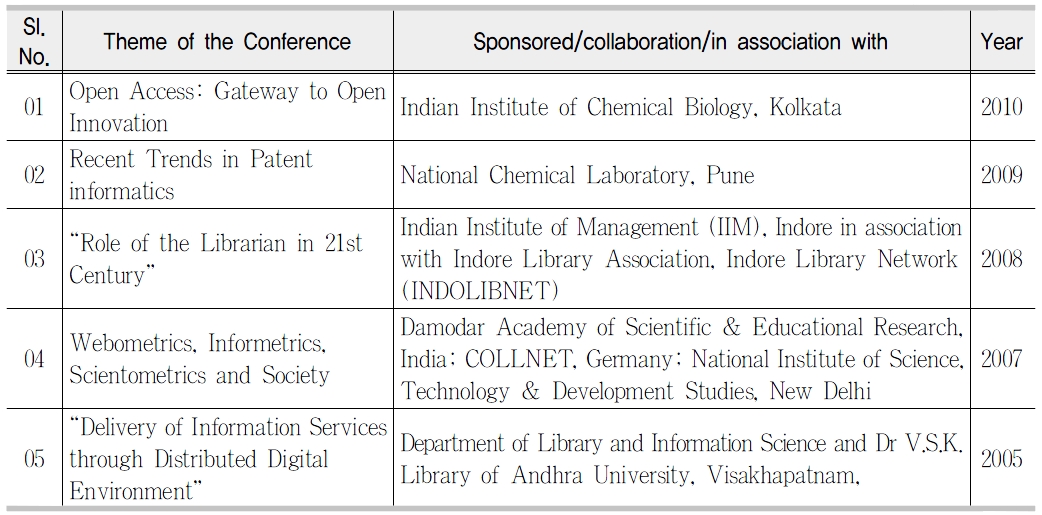
Society for Information Science (SIS)
[Table 5.] Management Libraries Network (MANLIBNET)
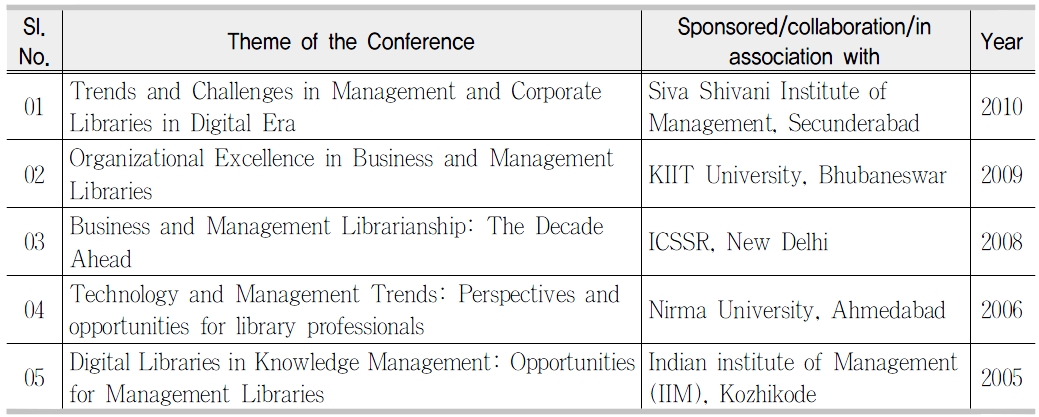
Management Libraries Network (MANLIBNET)
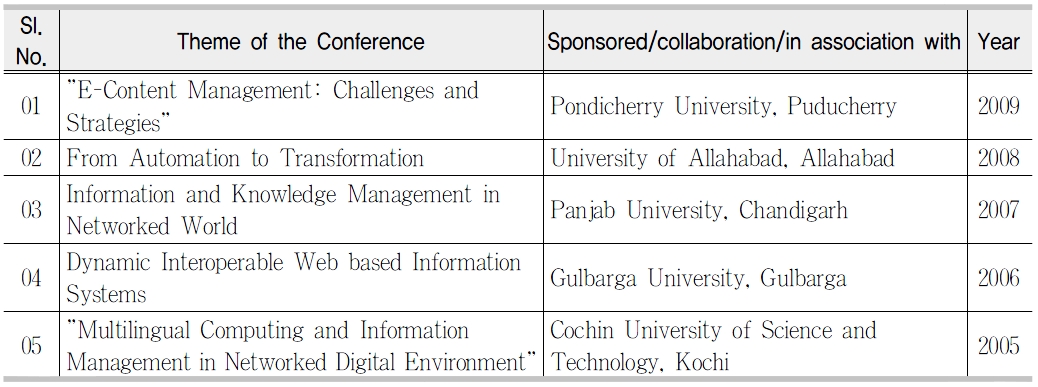
Annual Conventions of INFLIBNET - CALIBER(CONVENTION ON AUTOMATION OF LIBRARIES IN EDUCATION AND RESEARCH)
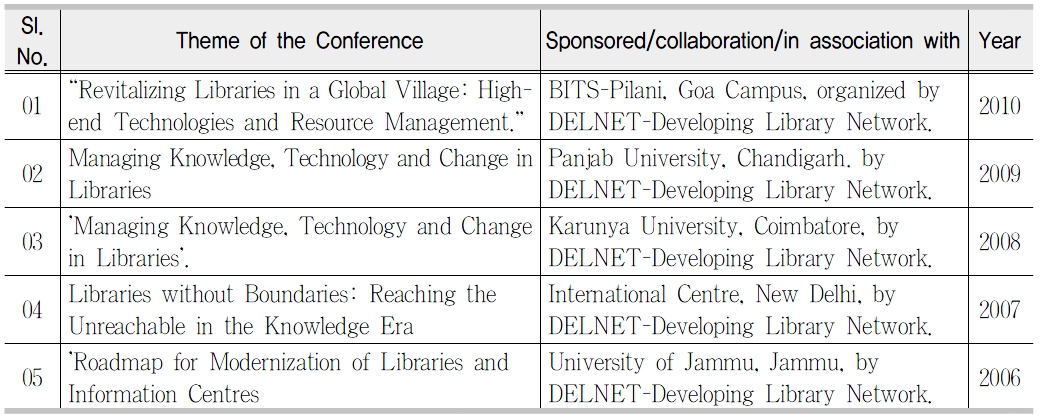
Annual Conventions of DELNET - NACLIN (NATIONAL CONVENTION ON KNOWLEDGELIBRARY AND INFORMATION NETWORKING)

List of Conferences/Seminars/Symposium Organized by other LIS Associations SpecializedAgencies Universities and LIS Departments in India since last 2 years
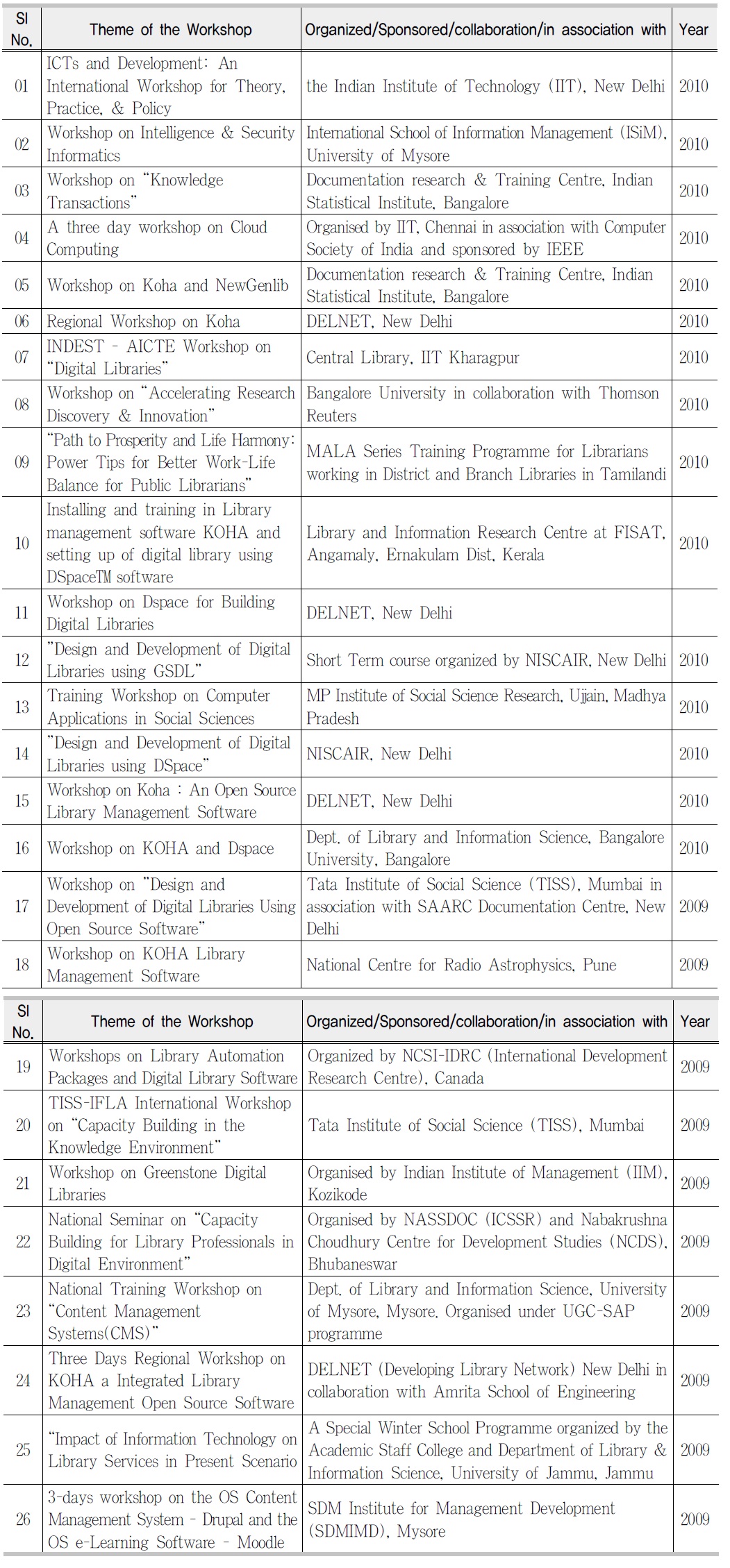
List of Workshop/Training Programmes Organized by LIS AssociationsSpecialized Agencies Universities and LIS Departments in India since last 2 years








